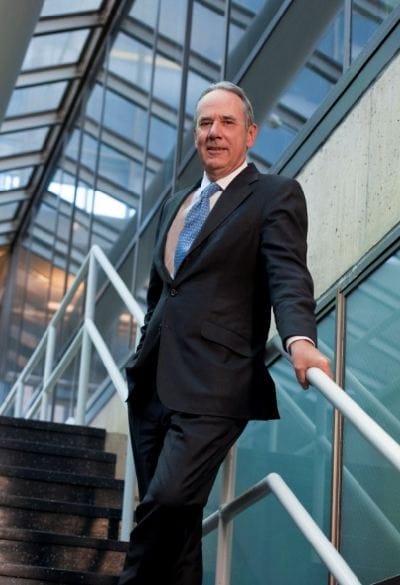Thomas J. Gallagher, C’73, WG’75, is a pre-eminent expert on corporate finance in the aerospace and defense industries. His is a four-decades-long career that took him from Wachovia, Oppenheimer and Chase Manhattan to his current role as managing director and CEO of Spectrum Capital Advisors. He’s written books and prognosticated impending trends. But if you want to see his eyes light up, talk about Wharton and his involvement with the School. He currently serves as a Class Engagement Ambassador, but his closer relationship began in 2000, when he opened his Charlotte home to the Dean and 100 Carolina alumni.
WHARTON MAGAZINE: What value do you derive in your professional life from your Wharton knowledge?
TOM GALLAGHER: It’s funny. I was telling my youngest son [who has been accepted to the Class of 2016] this not too long ago. There are very few days when I don’t get up and think about something that I learned at Wharton, either the way to frame a problem, the way to analyze a problem or the way to set up decision criteria. I learned the value of approximate precision instead of precise incorrectness.
I think the most vivid thing I learned was in operations research, an area that I was completely untutored in before I arrived at Wharton: the notion that there are seven or eight kinds of problems, archetypical problems, and most analysis is drawing on those archetypes. And by extension you can see that the world does not have an infinite number of problems. It has a finite set that can be attacked in a very rigorous and disciplined way.
WM: How did you get into banking?
GALLAGHER: Completely by accident. While I was going to school here as an undergraduate and graduate, I worked as an engineer for one of the broadcast networks. And I completely assumed that I’d just go back to work for CBS when I left here
But then I met a banker in town who said, “No, you don’t really want to do that. You really want to be a banker. Be a banker for four or five years. Learn the language of business. Apply the skills that you’ve learned at Wharton to real-world situations, and then decide what you want to be when you grow up.” And that was very, very wise advice. Being a banker, particularly an international banker, is sort of a backstage pass to the world.
WM: Is there a particular career accomplishment that you’re especially proud of?
GALLAGHER: Some of my colleagues would say surviving five mergers was, but I guess I would say that there were two things. I was able to anticipate the Asian downturn in ’98 by looking at what was going on in the airline industry in Asia. I wrote an article somewhat boldly in Airline Finance about a downturn in Asia, and six months later Asia was flat on its rear end. And the second thing that I did was I anticipated consolidation in the defense industry just before 9/11 in the latter part of the ’90s after the Clinton downsizing and peace dividend.
That goes back to what you can learn in a program like Wharton’s MBA, and that is: You have to think forward, constantly think forward. And you have to be lucky too. But the process of thinking about and articulating a future set of events, even if you’re not right entirely in your prognosis, you still have a point against which to measure.
WM: Your family has quite a legacy here. Your father, two of three sons and your wife Lindy, AMP’75, are all alumni.
GALLAGHER: It’s a common shared experience. My father [Stanley, W’32] and his brother [Walter, W’37] loved the University. They were Depression-era kids, the first kids in their family to attend university. And for each of them, it was an inflection point, and they never forgot that.
And without proselytizing, they instilled that in me and my wife and our kids. And so while my father did not live long enough to see my oldest son admitted to Penn, his brother did, and he was very proud of that. It’s an experience that binds us. My kids understand that attending a school like Penn is not a legacy, and it’s not an entitlement. You have to earn it. And maybe you have to earn it twice over.
WM: What’s your favorite spot to travel to for business?
GALLAGHER: One, my favorite spot to travel to for business is New York City. It’s the epicenter of business. Another favorite spot that I have traveled to for business in the past is probably Saigon. It’s one of the most interesting and pleasantly unsettling cities on the face of the earth.
WM: What you were like as a student?
GALLAGHER: I really enjoyed Kite & Key, and I really enjoyed student tours. I think I was reasonably shy when I was a freshman, and I had the opportunity to take a lot of families around and show them Penn on a one-on-one basis. I figured out in the wonderful architecture of this place all the really neat places that were distinctly Penn, and I enjoyed selling the University. And in many respects it overcame my natural reticence.


























